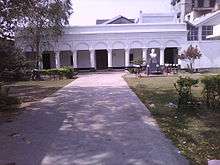Jyoti Prasad Agarwala
| Jyoti Prasad Agarwala | |
|---|---|
| Born |
17 June 1903 Tamulbari Tea Estate, Assam |
| Died |
17 January 1951 (aged 47) Tezpur, Assam |
| Other names | Rupkonwar |
| Occupation |
Film producer Film Director Music composer Poet Dramatist Writer |
| Years active | 1932–1951 |
| Spouse(s) | Devajani Bhuyan |
Jyoti Prasad Agarwala (Assamese: জ্যোতিপ্ৰসাদ আগৰৱালা; 1903 - 1951) was a noted Assamese playwright, songwriter, poet, writer and film maker from Assam. He was considered as Assamese cultural icon, deeply revered for his creative vision and output and is popularly called the Rupkonwar (ৰূপকোৱঁৰ) of Assamese culture. In fact, he is regarded as the founder of Assamese cinema for Joymati (1935).[1] His death anniversary (17 January) is celebrated as Silpi divas (Artists' Day) in his honor.
Biography

Jyoti Prasad Agarwala was born on 17 June 1903 in an Agrawal family, to Paramananda Agarwala and Kiranmoyee Agarwala in Tamulbari Tea Estate. His uncles were renowned Assamese poets Chandra Kumar Agarwala and Ananda Chandra Agarwala. His forefather, Nabrangram Agarwala, had come to Assam in 1811 from the Marwar region in Rajasthan. After completing his studies in various schools in Assam and Calcutta (Kolkata), he matriculated in 1921. He went to Edinburgh in 1926 to study economics, but returned in 1930 before completing his course. On his way back, he spent seven months at the UFA studio in Germany learning film-making.

After his return to Assam, he continued his activities for Indian independence that had disrupted his studies earlier and in 1932 he was imprisoned for fifteen months. He established the Chitraban Studio at the Bholaguri Tea Estate and began filming the movie Joymoti around the end of 1933. This was the first film from Assam. The film, released in 1935, was based on a play by Laxminath Bezbarua about the heroic Ahom princess Sati Joymoti imprisoned and tortured by a repressive Ahom swargadeo. In 1936 he married Devajani Chaliha. In 1941 he participated in the freedom movement, and in 1942, he went underground to escape British repression. Toward the end of his life he moved from a romantic to a more radical vision, which was reflected in his works.[2]
He died of cancer on 17 January 1951 at 'Poki', Tezpur
Works
Songs
Jyoti Prasad Agarwala had written around 300 songs, many of which he had set to music himself. Collectively, these songs are called Jyoti xongit.[3]
Plays
- Sonit Kunwori
- Karengar Ligiri
- Rupalim
- Nimati Konya or Rupkonwar
- Sonpakhilee
- Khanikar
- Kanaklata
- Sundarknowar
- Lobhita
Film
Agarwala is lauded as the creator of Assamese cinema. In a period that saw the beginning of Indian Cinema, with.
- Joymoti[4] (1935)
- Indramalati[5] (1939)
Poems
- Jyoti Raamaayon - Poetry Collection
- Luitor Paaror Agnixur - Poetry Collection, 1971
Others
- Background of Assamese Architecture
Stamp
In honor of Agarwala's contributions to Assamese literature and film, the Government of Assam issued a commemorative stamp of Agarwala in 2004. It was pushed for by the AGP and approved by the Prime Minister of India in mid-2004.[6]
See also
- Jyoti Chitraban Film and Television Institute
- Assamese literature
- List of Assamese writers with their pen names
References
External links
| Assamese Wikisource has original text related to this article: |
| Wikimedia Commons has media related to Jyoti Prasad Agarwala. |